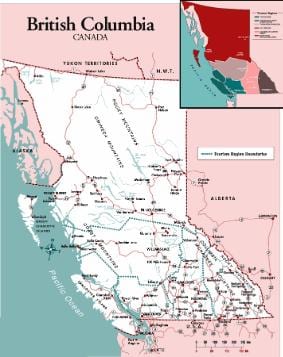Teacher Susan Trabant says she left a Jan 24 school board meeting “feeling fairly optimistic” that Prince George school trustees will introduce an anti-homophobia policy similar to those that have slowly been coming into existence across BC.
“They won’t have to reinvent the wheel because there’re already 15 different districts in BC that have stand-alone policy. They’re all available on the BCTF website,” she says.
Trabant told the trustees that her students may know “it’ll get better” after high school, but she is determined to make it better for them now. She wants a framework “to deal with homophobia and homophobic name-calling in a structured and similar manner throughout all Prince George schools.”
Trabant, who runs the gay-straight alliance (GSA) at Prince George Secondary School, says the school is the GSA headquarters for students in the district’s Bowl Area, while students in the northern and southern areas are served by GSAs run out of Kelly Road and College Heights,respectively.
The climate in schools has improved, Trabant notes, but students still face a lot of discrimination.
In 2002, 18-year-old Jamie Lazarre killed himself, leaving a note saying he couldn’t take the harassment anymore. Lazarre’s suicide prompted his friend Shawn Peters and a committee of queer activists to approach the school board about tackling homophobia in the district’s schools. Two years after Lazarre’s death, Peters told Xtra about a series of recommendations the trustees passed to raise awareness about homophobia and develop some concrete lesson plans teachers could use. The lesson plans were to focus on homophobic language and its power to hurt people, but they weren’t mandatory.
“Kids are still hearing, all the time, comments about fags, comments about lesbians or dykes, still having things thrown at them, still having people make disgusted comments,” Trabant says.
While GSAs have alleviated some of that behaviour, Trabant says it’s not enough.
“Kids often talk about teachers ignoring it. Well, I don’t think it’s so much teachers are ignoring it [as] I think they don’t understand or know how to deal with the issues that are in the school,” she says. “A huge part of this policy is that we need to have education classes for teachers, admin, trustees so that everybody is more comfortable and understands and knows how to deal with these issues in a school.”
School board chair Sharel Warrington says trustees are “extremely sympathetic and understanding” of students who have endured discrimination. “There’s no place for those kinds of behaviours to happen in our schools, and we feel very strongly about ensuring our students have safe environments where they’re respected — all students.”
Warrington can’t say whether the stand-alone policy Trabant and other speakers called for will be introduced. “We will look at it, though. The board certainly hasn’t made a decision one way or the other,” she says.
The recommendation has now gone to the policy and governance committee, she says. “That committee will review all of our policies and review the request and make a recommendation to the board about whether our policies are, in fact, adequate, or whether we need to do more.”
Asked if she expects any backlash from parents, Trabant says she thinks the proposal has general support. “I do find the community itself to be fairly LGBTQ-accepting. Of course, we’re going to have parents that, for whatever reason, don’t agree with LGBTQ issues in the school or don’t even want to have this be something to talk about, or have a policy put in place,” she acknowledges.
About 700 kilometres south of Prince George, teacher Gai Brown is spearheading Mission’s first club for gay students at her high school.
“I wouldn’t say it’s a gay-straight alliance in the sense that the kids who come to the club regularly are gay kids,” Brown told Xtra. “I do think we’re the only school that has such a club right now.”
Brown named the club GAB after her ailing gay brother, who had been active in civil rights. “I started the club by telling his story to my students, so they were quite impressed with that, because they don’t have the same relationship to the actual struggle for civil rights now that he lived through.”
Brown expected some kind of backlash. “My husband said to me, ‘Brace yourself, because you’re going to get people calling and going, ‘You’re trying to turn my kid gay,’” Brown recalls.
“Not a whisper,” she reports. “That’s been really lovely.”
“Mission’s a bit of a kickass town; it’s a working class, rednecky kind of place. I was amazed that even some of the staff that I suspected wouldn’t be supportive, were,” she says.
Mission is also “the best football school in the province,” having won the provincial championship, Brown points out. “Generally that comes with a lot of homophobia. When we did Purple Ribbon [day], I was amazed at how many big, strapping, jock guys came along and bought ribbons,” she says.
Brown, who teaches theatre at Mission Secondary School, started GAB last September.


 Why you can trust Xtra
Why you can trust Xtra


